#with real character traits positive and negative ones
Explore tagged Tumblr posts
Note
Hey so, do you ever feel.. Iffy? Bad? Disappointed? That the Fandom at large only became interested in whistlepaw thanks to faer ship with Frostpaw? I admittedly was feeling a bit like that when the ship first started popping up, although I understand that Whis is quite a background character aside from that (and up until then, more or less). So like I get why fae would gain more traction only now but Idk. I can't help but feel a little sad about it since you've made me develop an attachment to this cat. Just curious about your thoughts on the matter!
I get chronically attached to background nobodies, so I'm used to people not really caring about my faves and I honestly like it more that way because popular characters are A Mess of discourse and drama,
but yeah it is a bit sad that Whis is only really seen as a love interest for Frostpaw in the major fandom, but in a way that's also what fae is in the books. Whistlepaw does nothing outside of supporting Frostpaw (and that annoys me So Much for daily whis purposes, I want more material!!!) and I can't blame the fans for not latching onto background WindClan cat #78 and making up a whole world around them
in the end the fandom portrayal is kinda bland, but inoffensive at least. I made Whistlepaw my little silly and have never really cared about the fandom at large; Fae's basically my oc at this point and if a few people enjoy what I do then I'm content
#morningtalks#I understand where you are coming from#I've just always had a more unbothered approach with how many people I attract to my art#I do want to make the whisses a bit more developped#alas canon doesn't give me a lot#except for Wind (which I will probably read in the summer but technically I'm really not there with the books#(I'm halfway through AvOs on a reading standpoint because I read them in dutch translation)#but I might make an exception for The Whis Content)#so it'll be up to me to add more drama to the whisses#I've been thinking of creating a sort of story that I'd have going on for a few consecutive days#but I do kinda struggle to come up with a believable conflict for this plot that isn't just#''stripekit gets stolen by a bird of prey; go save them! (they survive I promise)''#(which I have thought about last year but I'm not too keen on this idea for a plot)#but an interesting story wants conflict so I'm kinda still just tooling around in the void#but I'll see what nonsense I can get up to as soon as the summer arrives#because a more plot-based whis event could be fun to plan and post day by day#I'll also try to nail down a Real character for Whis#because right now Whis is really one of those amorphous blobs o :) in my head and I want to fix that#with real character traits positive and negative ones#and make whis more interesting because whis is my oc at this point and I will make the art for whis I crave
1 note
·
View note
Text
How to Craft a Compelling Morally Grey Character: A Step-by-Step Guide
Step 1: Define the Character’s Core Traits
Identify Strengths and Virtues: List positive traits that make the character likable or admirable. These could include bravery, intelligence, loyalty, or compassion.
Identify Flaws and Vices: List negative traits that add complexity and realism. These could include arrogance, selfishness, impatience, or a propensity for violence.
Step 2: Establish Motivations and Backstory
Create a Detailed Backstory: Develop a background that explains why the character has their particular mix of virtues and flaws. Consider their upbringing, significant life events, and personal experiences.
Determine Core Motivations: Identify what drives the character. Is it revenge, love, ambition, survival, or something else? Motivations should be realistic and relatable.
Step 3: Develop Moral Ambiguity
Set Up Moral Dilemmas: Place your character in situations where they must make difficult choices with no clear right or wrong answer. These dilemmas should challenge their morals and reveal their complexity.
Showcase Contradictions: Allow the character to make decisions that might seem contradictory. For example, they might commit a crime to protect someone they love, revealing both a moral and an immoral side.
Step 4: Create Dynamic Relationships
Construct Meaningful Relationships: Develop relationships with other characters that highlight different aspects of your morally grey character. These relationships can help explore their multifaceted personality.
Use Relationships to Drive Conflict: Relationships can be a source of moral conflict and development. Conflicts with friends, family, or rivals can push your character to reveal their grey areas.
Step 5: Show Consequences and Growth
Illustrate the Impact of Actions: Show the real-world consequences of the character’s morally ambiguous decisions. This adds realism and stakes to the story.
Allow for Character Growth: Let your character evolve. They might become more virtuous or more corrupt over time. This evolution keeps the character dynamic and interesting.
Step 6: Balance Sympathetic and Unsympathetic Traits
Make Them Relatable: Ensure the character has traits or experiences that the audience can relate to or sympathize with, even if they do questionable things.
Maintain Complexity: Avoid making the character too sympathetic or too unsympathetic. The balance between good and bad traits should make the audience feel conflicted about the character.
Step 7: Use Subtlety and Nuance
Avoid Clear Labels: Do not overtly label the character as good or evil. Allow their actions and motivations to speak for themselves.
Employ Subtlety: Use nuanced behavior and dialogue to reveal the character’s moral complexity. Avoid heavy-handed exposition.
Step 8: Test and Refine
Seek Feedback: Share your character with others and seek feedback on their complexity and believability. Adjust based on constructive criticism.
Refine Motivations and Actions: Continuously refine the character’s motivations and actions to ensure they remain compelling and consistent throughout the story.
Example: Crafting a Morally Grey Character
Core Traits:
Strengths: Intelligent, determined, loyal.
Flaws: Arrogant, manipulative, vengeful.
Backstory:
Grew up in a tough neighborhood, witnessing crime and corruption.
Lost a loved one to a gang, fueling a desire for revenge.
Motivations:
Driven by a need to protect their remaining family and seek revenge.
Moral Dilemmas:
Joins a criminal organization to infiltrate it and bring it down from within.
Struggles with the ethical implications of committing crimes for a greater good.
Relationships:
Has a strained relationship with a sibling who disapproves of their methods.
Forms a complicated friendship with a morally upright police officer.
Consequences and Growth:
Faces the legal and emotional consequences of their actions.
Gradually questions their own morality and seeks redemption.
Balance:
Helps the community but uses unethical means.
Shows moments of kindness and ruthlessness.
Subtlety:
Reveals their inner conflict through small actions and dialogue.
Avoids overt explanations of their morality, letting the audience interpret.
By following these steps, you can create a compelling morally grey character that adds depth and intrigue to your story.
---
+ If you find my content valuable, consider Support This Blog on Patreon!
#writing tips#writing advice#character development#writers on tumblr#writeblr#creative writing#fiction writing#writerscommunity#writing#writing help#writing resources#ai assisted
2K notes
·
View notes
Text

to me this is what slay the princess is really all about. not about grand concepts of life and death, not about some distant cosmic concepts, it's about a very specific thing about our lives and how we deal with them.
it's about the fear that the things that happened to you shaped you in a way that made you worse and you need to fix and undo them, the fear that if this bad thing didn't happen to you, you would be better, and how, no: there is no judgement to be made on your experiences or how they shaped you. your experience do not worsen or better you, they just change you, and that change is important and good because it makes you more complete and fleshed out as a person.

you can bring such a huge variety of difference princesses to the shifting mound, parts of her who have experienced a huge range of emotions and events, from tragedy and pain to happiness and love and everything in between, princesses with a huge range of personalities and character, and she sees value in every single one of them. no matter how dark, painful, horrible a chapter it is, no matter what awful things have happened to them, no matter what kind of princess it is or how cruel or horrible she is or what she's done, she can find value in them, because they add to her, and complete her.
she can find beauty and meaning and substance in the vicious razor, appreciate her joyfulness, she sees the vengeful and petty witch as righteous because her bitterness from the betrayal she experiences formed in her an idea of right and wrong, she describes the terrifying nightmare as tender because she sees her inner sadness and sensitivity, she describes the vicious and vengeful wraith as 'driven' because she sees her power of will and determination.
she does not make any moral judgements on either the 'good' or 'bad' princesses, she sees their experiences and the traits and understanding of the world they add to her.
the important thing to her is to have experiences and perspectives that flesh her out and add to her, they let her grow and gain substance and understanding. she has nothing bad to say about any of them, and the only 'bad' thing she has to say isnt a bad thing it all, it's not having much to say at all about a damsel who has little experiences and little to offer her, and it's not a sentiment she ever expresses on her own.
and i mean, it says it right here at the start of the game right, 'there are no wrong decisions, there are only fresh perspectives and new beginnings'. and then this line from the ending where you return to th stranger:

this applies to TLQ too. tlq is stillness so he doesnt change as the shifting mound does, but he also has parts of himself and his character as represented by the voices, and all of them serve their purpose. all of them have value. they are not bad or good, they are not better or worse, they just are.
and like, to me where this actively applies to real life isn't this that you should seek out negative or bad experiences, or that you should actively suffer to build character or anything so extreme. it's a way to understand the bad things that already did happen and the pain and trauma you did experience, and a way to understand the pain and trauma that sometimes is inevitable as just a part of any life experience, because the most important and valuable thing to a person is to have any kinds of life experiences, positive or negative. and in the case of the negative, you are shaped and changed by it, but you are not worsened, you just become more. it carve texture around your heart.
387 notes
·
View notes
Text
Crafting Compelling Morally Gray Characters: A Guide for Fiction Writers

In literature, there is often a clear distinction between good and evil. Heroes are portrayed as virtuous and villains as wicked. However, in recent years, there has been a rise in the popularity of morally gray characters - those who do not fit neatly into the categories of good or evil. These characters are complex, flawed, and often make decisions that challenge the reader's moral compass. In this guide, I'll help you explore the art of crafting compelling morally gray characters and how to make them stand out in your fiction writing.
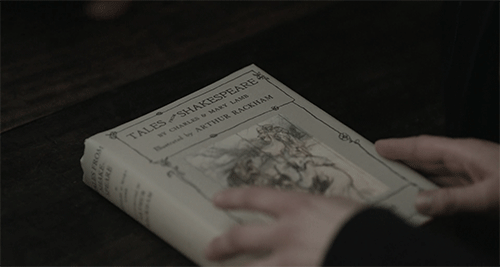
What Are Morally Gray Characters?
Morally gray characters, also known as morally ambiguous characters, are those who do not conform to traditional notions of good or evil. They may have both positive and negative traits, and their actions may be motivated by a mix of good and bad intentions. These characters often blur the lines between right and wrong, making them more relatable and intriguing to readers.
Examples of Morally Gray Characters
Some well-known examples of morally gray characters include:
Severus Snape from the Harry Potter series: Initially portrayed as a villain, Snape's true motivations and actions are revealed to be more complex and morally ambiguous.
Jaime Lannister from A Song of Ice and Fire series: Known for his arrogance and incestuous relationship with his sister, Jaime's character evolves throughout the series, showcasing his internal struggle between his duty and his personal desires.
Walter White from Breaking Bad: A high school chemistry teacher turned methamphetamine producer, Walter's character is constantly torn between his desire for power and his moral compass.
Why Are Morally Gray Characters Compelling?
Morally gray characters are compelling because they challenge the reader's perceptions of right and wrong. They are not easily categorized as heroes or villains, making them more relatable and human. These characters also add depth and complexity to a story, making it more interesting and thought-provoking.
The Power of Relatability
One of the main reasons morally gray characters are so compelling is because they are relatable. They are not perfect, and they make mistakes, just like real people. This makes them more human and allows readers to connect with them on a deeper level. When readers can see themselves in a character, it creates a stronger emotional connection to the story.
The Element of Surprise
Morally gray characters also add an element of surprise to a story. Their actions and decisions may not always align with what the reader expects, keeping them on the edge of their seat. This unpredictability makes the story more engaging and can lead to unexpected plot twists.
The Exploration of Morality
Morally gray characters also allow for a deeper exploration of morality in a story. By challenging traditional notions of good and evil, these characters force readers to question their own moral compass and consider the gray areas of morality. This can lead to thought-provoking discussions and a deeper understanding of complex moral issues.
How to Craft Morally Gray Characters
Crafting morally gray characters requires a delicate balance of positive and negative traits, as well as a deep understanding of their motivations and internal struggles. Here are some tips for creating compelling morally gray characters in your writing.
Give Them a Strong Motivation
Every character, regardless of their moral alignment, should have a strong motivation for their actions. For morally gray characters, this motivation should be complex and not easily defined as purely good or evil. It could be a desire for power, revenge, or even a sense of duty. This motivation will drive their decisions and actions throughout the story.
Show Their Flaws and Vulnerabilities
Morally gray characters are not perfect, and they should not be portrayed as such. They should have flaws and vulnerabilities that make them more relatable and human. These flaws could be physical, emotional, or moral, and they should play a role in the character's development and decisions.
Create Internal Conflict
One of the defining characteristics of morally gray characters is their internal conflict. They are torn between their good and bad tendencies, and this struggle should be evident in their thoughts and actions. This internal conflict adds depth to the character and makes them more relatable to readers.
Avoid Stereotypes
When crafting morally gray characters, it's important to avoid falling into stereotypes. These characters should not be one-dimensional or defined solely by their moral ambiguity. They should have unique personalities, backgrounds, and motivations that make them stand out as individuals.
Show Their Growth and Development
As with any well-written character, morally gray characters should experience growth and development throughout the story. They should learn from their mistakes and make decisions that challenge their moral compass. This growth and development will make them more dynamic and interesting to readers.
How to Make Morally Gray Characters Stand Out
With the rise in popularity of morally gray characters, it's important to make yours stand out in a sea of similar characters. Here are some tips for making your morally gray characters unique and memorable.
Give Them a Distinctive Voice
A character's voice is an essential part of their identity. It should be unique and reflective of their personality and motivations. For morally gray characters, their voice should reflect their internal conflict and the complexity of their moral alignment.
Create a Strong Backstory
A character's backstory can provide valuable insight into their motivations and actions. For morally gray characters, a strong backstory can help explain their moral ambiguity and add depth to their character. It can also create empathy and understanding for their decisions.
Use Foils to Highlight Their Morality
Foils are characters who contrast with the main character, highlighting their strengths and weaknesses. For morally gray characters, foils can be used to showcase their moral ambiguity and challenge their beliefs. This can add depth to the character and create interesting dynamics between them and other characters.

Morally gray characters add depth, complexity, and relatability to a story. By challenging traditional notions of good and evil, these characters force readers to question their own moral compass and consider the gray areas of morality.
#thewriteadviceforwriters#writing#creative writing#how to write#writers and poets#writing tips#on writing#writeblr#writers block#authors on tumblr#authoradvice#writer#author#writerscommunity#morally grey characters#morally gray#morally grey villain#anti hero#writers#writers on tumblr#writerslife#writer stuff#writerscreed#female writers#writersociety#writing advice#writing help#writer tips#writing resources
1K notes
·
View notes
Text
sometimes rick is characterized as anti-willmack. but let me offer a separate webweaving where i think he may actually be quite pro-willmack
on knbr he says that
"macklin, i think, has really benefited from coming in as a rookie with will smith, they've developed a really close bond and friendship and so i think that's helped immensely"
and also that
"it's incredible...as a father...to see [mack] kind of do it with joy and just the good nature and fun that he's having doing it..." and that this is the "most satisfying from a parent's perspective"
so from a coaching/mental aspect of hockey position i suspect rick is actually quite pleased with this situation:
because i think will is so willing to go along with mack, especially on the ice
will really doesn't seem to rock the boat that much. mack doing things with a teammate is good for team chemistry - they practice together, workout together, etc
he has a big thing about attitude (one thing he and robyn won’t compromise on is character) and has "passed down lessons from [the] Warriors...about playing with joy, never being guided by anything other than the love of the game and privilege to play". apparently, the only time rick was hard on mack during his bu season was when mack "was just really negative...that was unacceptable," so i think rick truly does appreciate the positive energy that will brings to the table, and clearly admires that trait in people
if people have thoughts lmk! i feel that rick's relationship with will smith hockey is quite complex and funny, and is often warped because well, real person Fiction needs a problem for a compelling story, and rick is quite literally Right there.
the core of this complexity to Me is that rick has very clearly split himself into a father figure on one hand and a coach on the other, and sometimes its hard to know which side is talking, so as a result, sometimes we assume Coach rick would not like willmack, whereas parent rick does quite like them
i also have more thoughts about mack's relationship with his mom...coming soon as the youtubers say follow for more
side note; i also love this quote about mack from the article (because it's basically ghostwriter wsh2):
They’ve been granted the freedom to be their full selves, which for Macklin means being chill, and kind, and funny, and occasionally combustible
#willmack#will smith hockey#macklin celebrini#rick celebrini#thoughts nobody asked for#meta webweaving
172 notes
·
View notes
Text
Sakura Blossoms
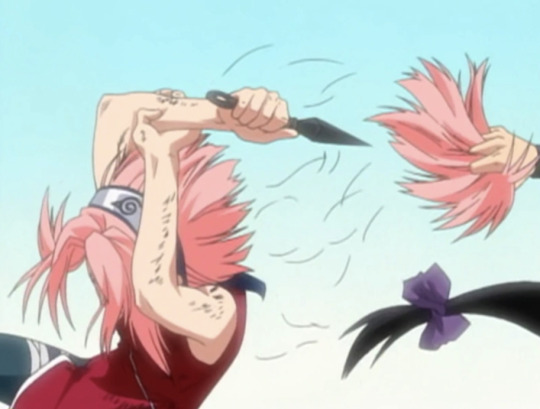
One of the most significant character moments for Sakura Haruno in the original series of Naruto remains one of the most misunderstood. This can, no doubt, be attributed to the fact that a large portion of shonen fans are incapable of understanding any form of writing that isn’t surface-level and doesn’t have to be spoon-fed to them. Many view this scene as an example of illogical decision-making by Sakura because she had an “opening” to stab her opponent, as shown here:

However, Masashi Kishimoto goes out of his way to provide two specific reasons as to why this approach wouldn’t work: a practical reason and a symbolic one.
Practically speaking, it is explicitly stated that had Sakura attempted to stab the Hidden Sound shinobi, it wouldn’t have worked.

It was also established very early on that there was a massive power imbalance between the two and that, no matter what Sakura did, the Hidden Sound shinobi would always have a counterattack because they were more skilled and had more experience. Hence, instead of using the Kunai to stab her opponent, as this particular Hidden Sound shinobi expected, Sakura decided to cut her hair—not only to catch her opponent off guard but because Sakura herself knew that stabbing her wouldn’t work; she’d simply be overpowered.
Symbolically speaking, the reason Kishimoto had Sakura cut her hair (the most important reason and the entire purpose of the scene in the first place) was to signify the beginning of her character arc. To understand this, we need to look at Sakura’s initial character traits and the perceptions she carried at the start of the series.
Initially, Sakura is introduced as a superficial, appearance-obsessed, boy-crazy girl who has a no real understanding of what it means to be a shinobi.
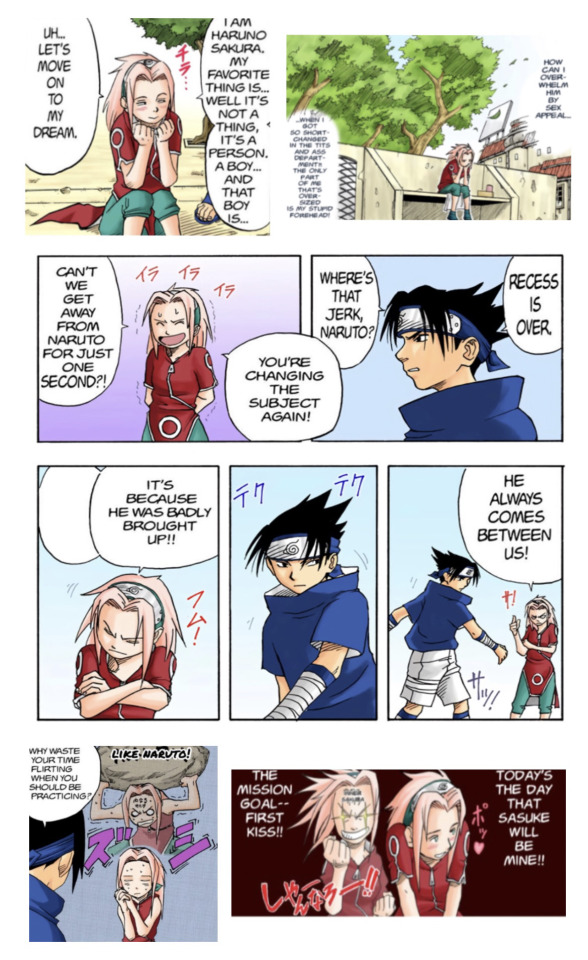
She even outright admits to already considering herself a full-fledged ninja despite having done nothing to earn that title.

This false self-perception is what leads Sakura astray compared to her teammates. She becomes disinterested in the idea of training to become stronger and doesn’t work for the skill she so desperately needs at this point in the story. In her mind, there’s no point in training if she’s already graduated the academy and become a “full-fledged” shinobi. Her own arrogance and naïveté on the subject even lead her to believe that she’s fully superior to her teammates on Team Seven.

However, as the story progresses, we see Sakura’s inexperience in battle and taijutsu, combined with her misguided priorities (particularly her obsession with Sasuke) and her arrogance regarding her own self-perceptions, make her overly reliant on her teammates. This not only makes Sakura a burden to her team but shows the consequences of her actions, behaviours, and beliefs.
The forest of death arc is so crucial for Sakura‘s character, as it pushes each member of Team Seven into moments of growth. For Sakura, it where she learns the true meaning of being a shinobi and the trials and tribulations that come along with it. Sakura is put in a situation where she’s forced to fight on her own for the first time in her life to protect her two teammates. As she does, her enemy grabs her by the hair, trapping her. With no escape, Sakura takes her Kunai and cuts her hair.

In this moment, Sakura is physically cutting off an aspect of her identity that aided in the superficial virtues of her character, both physically and emotionally. She is unbinding herself to the girl she used to be, freeing herself of her negative qualities and traits, and most importantly, her false self-perception regarding the identity of a shinobi. The act of haircutting within literature can carry various meanings, but the most common symbolism behind it is to mark a character’s transition into a new stage of life. In Ancient Greece, it was tradition to cut one’s hair as a sign of mourning, symbolizing a positive or negative change for the character. In Sakura’s case, she is “killing” her past self and mourning this loss through the act of cutting her hair, while also stepping in to a new sense of self with a clearer understanding of what it means to be a ninja and the harsh realities that follow it. That’s why this line:

Is so important because it serves as a representation, both figuratively and literally, that it’s Sakura’s turn to step into the role of a true shinobi—to be someone her teammates can count on and, most importantly, to say goodbye to the girl she once was.
What’s more is that we actually see how this character development impacts Sakura’s throughout the series. The Forest of Death scene is more than just words; it marks a transition she carries forward, not only becoming someone her comrades can rely on but also becoming someone who understands the deeper nature of things and people rather than viewing them through a superficial lens. This growth is especially evident in her desire to become stronger, seeking out training from a Sanin, and in the way she begins to see Sasuke after the Forest of Death. Instead of viewing him merely as an attractive classmate she has a crush on, she starts to see him for who he truly is—a traumatized boy falling prey to his own pain and going down a dark path. This new perception makes her want to help him, both physically and emotionally, rather than simply wanting to make him hers, as she did initially.
Ultimately, this scene is what gave Sakura the development to become the character she was at the end of the series—a strong kunoich and a true, full-fledged shinobi, as well as someone who can genuinely understand the pain and trauma of others.
#sakura haruno#naruto#naruto uzumaki#sasuke uchiha#kakashi hatake#team 7#sasusaku#team 7 naruto#naruto shippuden#anime#literary analysis#ino yamanaka#shikamaru nara#choji akimichi#tsunade#uchiha clan#masashi kishimoto
327 notes
·
View notes
Text

Something I've noticed about the "Karen Client" is that her design evokes a rose. Roses are symbols of love, and the forms Sinners have in hell are supposed to be symbolic of their mortal lives. Alastor was a hunter and became a hunted animal, Martha died in the woods and she has branch-like horns (though they look more like they're sticking out of her hair).
This made me think that Karen was genuinely in love with her husband and did suffer from a broken heart. I can't see any other reason for her sinner appearance looking like that.
Realistic characters are complex: they have a blend of positive and negative traits.
Rather than being an one-dimensional "karen stereotype" who is just homophobic, she could've been much more interesting as a sympathetic character who suffered real heartbreak, wondered if she wasn't enough and placed a hit on her husband in the hopes of seeing him again.
243 notes
·
View notes
Text
Life series theory / analysis
// SPOILERS for Wild Life finale!
Okay so I have a theory about the winners and their character development throught the series:
Is it just me, or is Joel the only winner who had a positive character development through the series?
Just so that we're on the same page: Character development refers to cultivating certain traits in individuals that help guide their behavior. That means positive character development cultivates positive traits in a person, and negative character development (yes it's a thing) cultivates the negative traits. I was thinking about the finale of Wild Life and all of the winners and honestly? Joel seems to be the only one with positive character development. Also, I'm only talking about the characters, not the content creators, just so that there are no weird insinuations.
Let's go over the winners first, shall we?
Grian - the creator of Life and the one establishing the rules - immediately goes on to break them with an unprovoked green-on-green kill on Scar. Not to mention the toxic codependent yaoi these two developed on the desert and still can't leave behind.
Scott - the guy who was seen as one of the most loyal, ended up winning while avenging all of his fallen allies - learning that even alliances are fleeting and he can't keep himself too tied to anyone. The moment the next game starts, he almost immediately bounces from his goverment assigned soulmate and isn't really keen on making things even between them. Even at the end, the decision to sacrifice himself for Pearl is his and his only.
Pearl - do I even have to say it? Being rejected by the one person who was supposed to have her back, she turned on everyone and seemed better for it. Her trauma was not her fault, and neither was the negative character development - but it did occur.
Martyn - I could write a whole essay on LimL!Martyn and one day I shall do that. The guy that lost his therapy dog for 24h and proceeded to make enemies all across server, gain one (1) ally and backstab him at the final moment. Like cmon.
Scar - the somewhat oblivious, but kindhearted social butterfly (U think I can call him that?) decided he's better on his own and withdrew from the others, slowly turning into the villain of the server. Every time he had allies, he ended up worse for it - but this one time, even he couldn't believe "How did the guy with no friends win?"
Cleo - okay this one is a bit murky, since Real life was so short (and some people even consider it non canon but I digress). I'd just say that it was so short, they didn't really have any time for character development - but if you saw something interesting, lemme know.
And then there's Joel. The guy who struggles with keeping alliances and the moment he turns red, he only sees red. But the one time he starts depending on his family, the one time when he tries to keep himself out of red for as long as possible and doesn't fully give in to the bloodlust after turning red - he wins.
Anyways thank you for coming to my TED talk, if you noticed anything interesting lemme know Also this is like not very serious, I haven't watched all winners POVs so sorry if I accidentally mixed something up
#trafficblr#life series#lifeseries#limited life#last life#wild life smp#double life#secret life#3rd life#wild life#wild life spoilers#wild life smp spoilers#grian#scott smajor#smajor1995#pearlescentmoon#zombie cleo#martyn itlw#martyn inthelittlewood#gtwscar#goodtimeswithscar#joel smallishbeans#smallishbeans#theory#crack theory#mcyt#character development
238 notes
·
View notes
Text
There's something I see overlooked when discussing the different character traits of the Color Gang members. Red is hot-blooded and the first to throw a punch, yes, but after that, he does not give up. Once he puts his mind to something, the guy just won't quit. He's almost pathologically stubborn and determined.
He's the last one to get taken over by the Orb, and he dives right into the ensuing 4v1. This kind of bravery isn't universal to the Color Gang - even Second Coming was paralyzed with fear when the Dark Lord vaporized all four of her friends.
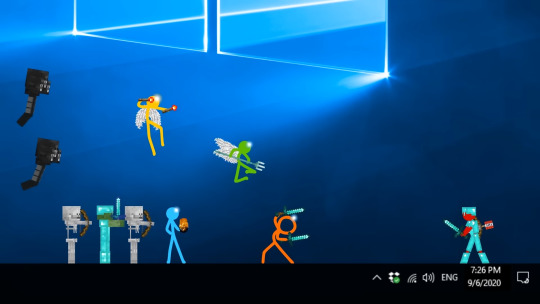
In vs. League of Legends, he's the only one who still wants to try and fight to win the game after the entire group has been decimated by Purple's cheating.
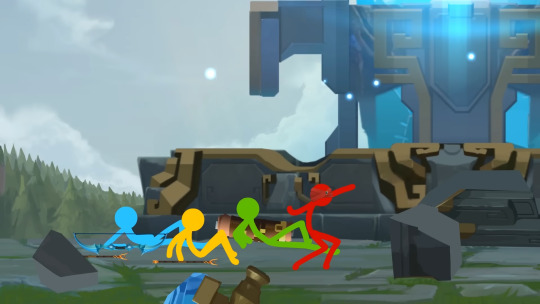
When everyone's trapped in the Parkour loop, Red isn't the first one to get past his designated Brute guard, but he's the only one to get past without drawing a real weapon or using some outside-the-box tactic. He just keeps getting back up and fighting bare-handed until he wins.
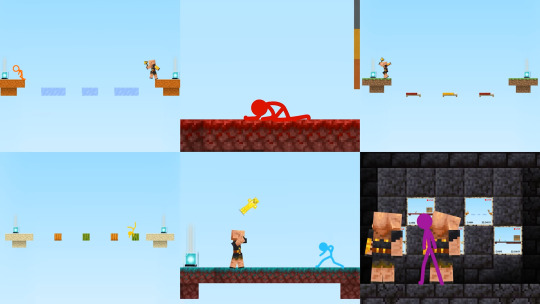
This even applies to situations that don't involve fighting; in the Monster School, Red wasn't ready to give up on befriending his teammates even after putting up with their constant bullying. Hell, he's not ready to give up even after they keep bullying him while he's actively helping them.
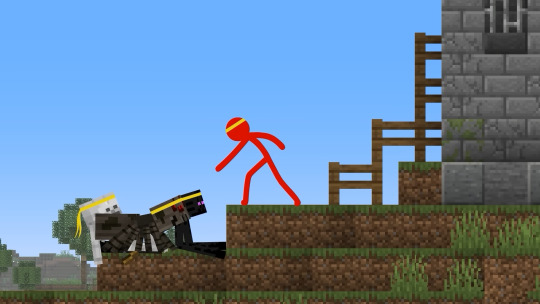
Both times the Color Gang make their desperate last stand against King, Red is the first one to stand up, ready to keep fighting against impossible odds.
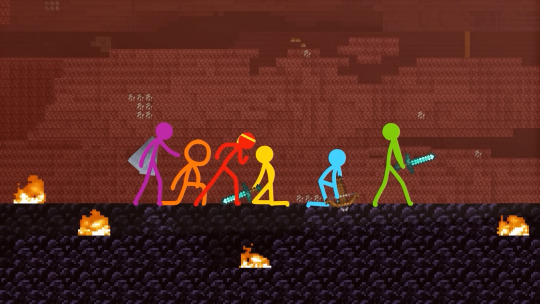
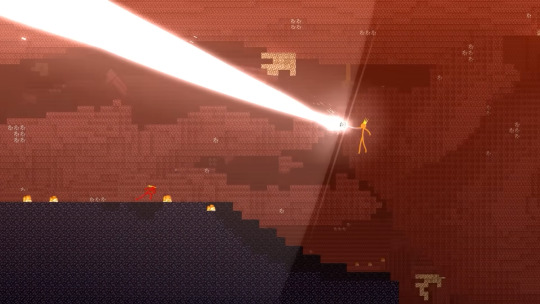
I know this next one is more silly, but he won't even let go of wanting to take a nap in the Nether, something that Yellow explains will kill him.
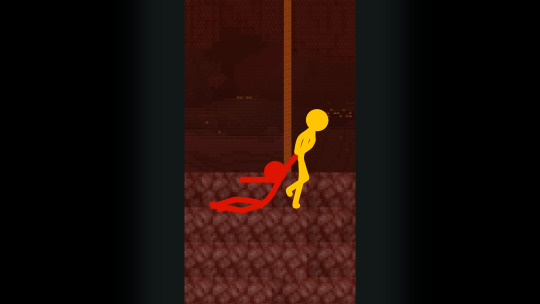
Despite the obvious dangers, Red can't let go of the idea of putting a Lucky Block in King's staff to see what could be achieved by combining them.
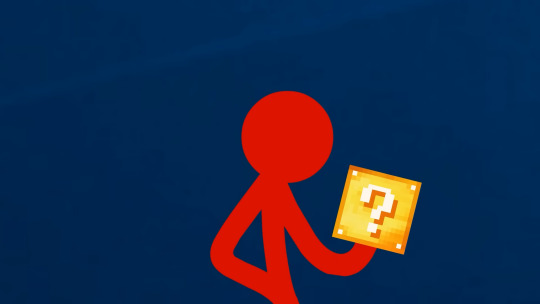
Do I even need to say anything about The Prank?
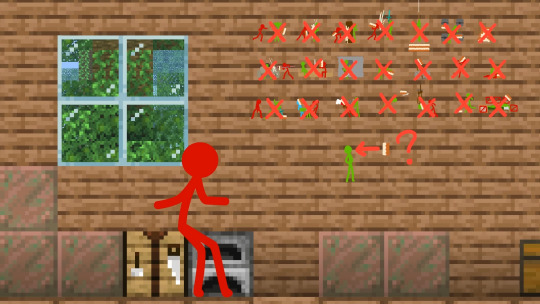
It takes four of GreenScreen's duplicates to pin him up to the wall, and he's still throwing punches.
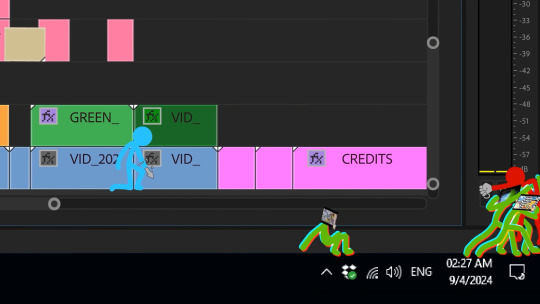
When he has a chance to appease GreenScreen and get it to stop being so violent to them, he instead taunts it.

And when all the rest of the Color Gang are finding ways to entertain themselves while trapped by GreenScreen, Red seems to just be going crazy with boredom because there's literally nothing he can do in this situation to fight back.

Red is crazy determined and stubborn. It's both a positive and a negative character trait based on the situation, but I don't ever see anyone talking about it compared to people talking about how he's hot-blooded.
223 notes
·
View notes
Note
how to create good characterization naturally? The chemistry in between characters without seeming forced
Great character chemistry can turn a good story into one that readers can’t forget. It’s a spark that makes your characters’ relationships seem real and exciting. Let’s look at how to make your characters interact in a way that feels natural and keeps readers hooked from start to finish.
Behaviour
Have characters unconsciously mirror each other’s actions.
Include small acts of intimacy, like sharing inside jokes or personal anecdotes.
Show characters prioritising each other’s needs or sacrificing their interests for the other.
Develop unique habits that characters only exhibit around each other.
Use consistent, unique actions or quirks that reveal a character’s feelings.
Create scenarios where characters defend each other’s viewpoints or actions to outsiders.
Allow characters to show vulnerability around each other.
Have characters unintentionally adopt each other’s mannerisms or phrases over time.
Have your characters make an effort to engage in activities they don’t typically enjoy, just to be with the other person.
Show characters naturally falling into synchronised rhythms, like walking in step.
Interactions
Lace your dialogue with subtext.
Have characters finish each other’s sentences or speak in unison without planning it.
Include playful banter and light teasing.
Allow for moments of comfortable silence that show a mutual understanding and connection.
Conflicts should be heated, but often end in mutual respect and a stronger bond.
Write intimate conversations where characters share secrets or dreams.
Develop scenes where characters work together seamlessly, anticipating each other’s moves.
Write moments where one character can tell what the other is thinking just by looking at them.
Have interactions where characters seek each other out for advice or comfort.
Create situations where characters celebrate each other’s achievements genuinely and enthusiastically.
Body language
Subtle touches like brushing hands or a gentle push that lingers just a moment too long.
Leaning towards each other while talking, showing attraction or interest.
Describe the way characters mirror each other.
A characters’ eyes lighting up or softening when they look at each other.
Positioning themselves between their partner and a threat.
Unintentional proximity, like standing or sitting closer than necessary.
Nervous gestures that characters show only around each other, like fidgeting or playing with their hair.
Warm, genuine smiles that are reserved for one another.
Instinctively reaching out to comfort each other in times of distress.
Relaxed posture in each other’s company.
Attitude
Show a respect for one another that they don’t show with others.
Are consistently patient with one another’s flaws.
Willingness to compromise or find middle ground.
Giving each other the benefit of the doubt in misunderstandings.
Unconditional support during difficult times.
Take pride in each other’s accomplishments, without jealousy.
Consistently have faith in each other’s abilities and decisions.
Openly express admiration for one another’s talents or character traits.
Maintain a positive outlook on the other’s intentions, even when they make mistakes.
Show an understanding between characters that goes beyond words.
Positive story outcomes
Stronger alliances or partnerships.
Romantic subplots that add depth and interest to the main story.
Believable character development as they influence each other positively.
Moments of triumph where their combined strengths overcome obstacles.
Deep, meaningful friendships.
Can easily resolve conflicts that seemed insurmountable.
Celebration is more impactful due to their shared success.
A fortified sense of trust that can be pivotal in critical story moments.
Enhanced reader investment in the characters and their relationships.
Openings for sequels or spin-offs based on popular characters dynamics.
Negatives story outcomes
Conflict arising from misunderstanding or jealousy.
Unresolved tension between characters on the outside.
Can lead to unnecessarily complex emotional entanglements
Creates obstacles due to the characters’ strong connection being exploited by antagonists.
Tragic outcomes when the chemistry between characters causes them to make irrational choices.
Intense confrontations that threaten the relationship.
Betrayals that are more impactful because of the depth of their relationship.
Unforeseen sacrifices that characters make for each other.
Heightened stakes when the wellbeing of one character is tied to the other.
Unexpected changes in the character when relationships are cut short.
Helpful vocabulary
Smitten
Love
Afffection
Desire
Charisma
Intimate
Playful
Magnetic
Affectionate
Devoted
Engrossed
Dynamic
Mesmerizing
Empathy
Kinship
Enthralled
Spark
Trust
Harmony
Synergy
Supportive
Heartfelt
Genuine
Symbiotic
Unbreakable
Deep-seated
Fascinating
Bonded
Authentic
Obsession
#writers#creative writing#writing#writing community#writers of tumblr#creative writers#writing inspiration#writeblr#writerblr#writing tips#writing advice#character chemistry#character development#how to write#writing tip#let's write#character description#character reference#resources for writers#helping writers#writing asks#writers block#writing resources#writers on tumblr#writer#writers and poets#on writing#writer stuff#help for writers#references for writers
904 notes
·
View notes
Text
Writing Notes: Positive and Negative Characteristics

POSITIVE. Mental strength: This ability is acquired by focusing on things under personal command, which reinforces the internal locus of control.
The behaviors that lead to mental strength are identified below (Morin, 2013):
Mentally strong people don’t feel sorry for themselves; instead, they take responsibility for their own life.
Don’t give away their power to others and thus maintain control over their emotions.
Individuals with mental toughness embrace change and are open to being flexible.
Control is placed on things under the person’s influence, such as their attitude.
Pleasing everyone is not a priority. While being kind and fair is important, making everyone happy is not.
There is a motivation for making calculated risks.
Focus on the present and make plans for the future.
Try to make better decisions in the future and try not to repeat previous missteps.
Demonstrate an ability to appreciate and celebrate the success of other people.
Don’t give up after a failure; instead, they keep trying until they get it right.
Tolerate being alone and staying in silence.
Don’t feel that the world owes them something; instead, they create opportunities for themselves by utilizing their own talents and merits.
Real change takes time, and mentally strong individuals understand this, so they’re patient.
These behaviors are positively supported by characteristics such as:
Tenacity: not giving up when things get tough or when problems arise
Confidence: belief in personal ability to find solutions to challenges
Optimism: the perception that the odds are in one’s favor
Adaptability: openness to new inputs and ideas
Self-Awareness: the ability to shift perspective
Reliability: following through with promises and goals
Responsibility: owning up to personal mistakes and errors
Wellbeing: making personal mental and physical health a priority
These and other characteristics help contribute to strong mental health (Half, 2016).

NEGATIVE. The opposite of open-minded, calm, conscientious, and agreeable characteristics are those defined by judgment, neuroticism, and an external locus of control. Some behaviors that fall into this category are:
Inability to accept setbacks
Lack of clarity and decision-making
Low capacity for critical thinking
Failing to build strong interpersonal relations
Always staying in the comfort zone
Helplessness and absence of persistence
Tendency to lean toward pessimism
Weak imagination and an inability to visualize desired outcomes
(Cardone, 2011)
Individuals with high scores in neuroticism often display narcissism, have inflated egos, and are emotionally distant, angry, hostile, and inflexible. These people tend to display the behaviors above.
Yet one key preventer of such negative traits, according to some studies, is self-control. “The more conscientious or prudent people are–no matter their other characteristics–the less likely they’ll be drawn toward harmful or illegal activities” (Chamorro-Premuzic, 2016).
Therefore, by increasing one’s self-awareness, individuals can spot their shortcomings and adopt habits to help balance out their personality traits. In turn, this helps them thrive.
Source ⚜ More: Plot ⚜ Character ⚜ Worldbuilding ⚜ Writing Resources PDFs
#writing reference#writeblr#dark academia#character development#psychology#spilled ink#literature#writing tips#writing prompt#creative writing#fiction#writers on tumblr#writing advice#story#novel#light academia#writing inspiration#writing ideas#pierre-auguste renoir#writing resources
170 notes
·
View notes
Note
I remember you did character opinion bingos of the twst charas, has your opinion changed significantly for any of them since then, whether positive or negative? Since it’s been awhile since you first made those and many stories have been released after that
[Referencing this tag!]






It’s hard to compare characters using Bingo boards, so I’ve included the current version of my personal character tier list for your reference. As I tend to say when I discuss my character preferences, these are just my opinions and are not meant to invalidate your opinions.
To answer some commonly asked questions (as I inevitably get these every time I reshare my tier list):
Why I don’t like Vil
Why I don’t like Skully
Why I don’t like Malleus (there’s multiple posts for this one; please see my pinned post and scroll down to the “I noticed that you don’t like Malleus. Why?” section to see the whole collection)
As for characters who have shifted since 2022:
Cater went up a tier. I explained why I don't like Cater in this post; it essentially boils down to him being a clout chaser and his annoying lingo (which is only made more frequent in the localization). However, Cater showed significant self-reflection and character growth in book 7. He also showed me a lot of his "cool" side, particularly in Ace, Trey, and even Riddle's dreams. You can read more about what Cater does specifically in these segments in this post and this post!
Jack went up a tier. I have always thought that he was lacking in character compared to the others in the cast. It doesn't help Jack's case that I also don't enjoy his design or general character traits or him being one massive friggin' DOG. However, Jack's dream in book 7 sheds some much-needed light on the extent to which he admires his dorm leader--something which I felt was not fully explored in book 2. You can read more about what exactly goes down in that dream here. I also must attribute some of Jack's ascension to @/tinyfantasminha, who has a really unadulterated appreciation for the big fella. It's been really enlightening listening to them explain why they love him so much.
Kifaji went up a tier. This is not so much because of anything Kifaji did in canon, but moreso because Leona's dream made me reevaluate my previous understanding of Kifaji. Dream!Kifaji has the distinction of being the first non-antagonistic NPC and actively pleads with the dreamer to "open his eyes". While this isn't something that the real Kifaji is doing, I think the mere fact that Leona's psyche manifested the grand chamberlain as his voice of reason implies Kifaji played a bigger role in Leona's upbringing than he would like to let us believe. For as much as Leona bitches and moans about the old man... It must have been Kifaji his main ally and source of comfort in the palace. With his father ill, his brother caught up in royal duties, and the other servants resentful of him, Kifaji was the one playing chess with his second prince, supporting him emotionally in his time of need. When I think back on Tamashina Mina, too... Kifaji doesn't shame Leona for things he cannot help. Yes, he tells Leona off for not respecting traditions or behaving rudely, but he doesn't talk down his abilities. No, Kifaji actually recognizes his talent and intellect, unlike the other servants who cower in fear or hold up the first prince instead.
Sebek went up a tier. Bro really made out like a bandit in book 7; he's the one person who gets consistent character development throughout its monsterous 290+ part run thanks to his interactions with the other first years centering him and that promise made during the farewell party early in the book. We also have Lost in the Book with Nightmare Before Christmas to thank for extra content which allows Sebek to shine and demonstrate his growth.
***Book 7 conclusion UPDATE:***
Lilia dropped several tiers. I felt that although he is a loving father, he too often enables Malleus's worst tendencies. It happens so frequently it got to the point where I could no longer tolerate it.
Not really a character going up or down, but I axed the "love ya <3" tier which previously existed above "unfortunately enjoy", as I felt it was just not a good use of space to make a tier entirely for one character. By that technicality, Jade dropped down a tier. The more I thought about it, I realized he really annoyed me in Azul's dream by wasting time. Jade also hasn't gotten any interesting content as of late, so I feel like that also contributes to my shift in feelings.
... Honorable mention goes out to Trey, who almost dropped down a tier simply for an uncomfortable implication his dream had 😭
If you're curious, other characters that have changed positioning from 2020 to 2022 are:
Jade went up a few tiers. He basically shot up to replace Azul. His personality ended up being what I had expected Azul's to be. Bonus points for being a butler (one of my favorite archetypes).
Azul dropped several tiers. He used to be my favorite character (around the time of Twst JP's release), but he fell from grace after Azul was revealed to have a much... "squishier" more bulliable true personality behind his cool, collected persona. Just not a fan of this type of character.
Leona went up several tiers. Book 2 was an awful first impression for him. Most other showings are MUCH better. If you want an extended explanation of my own journey with learning to accept this asshole, please see this post.
Idia went up a few tiers. My opinion of him mainly improved after book 6 and Glorious Masquerade. I like Idia primarily when he's being a good big brother figure.
Rook dropped down a tier. Leona has basically claimed his old spot. I think I just became a little annoyed that he doesn't get much expansion of his lore/background. I get it, part of his appeal is that he's mysterious. Still frustrating that we barely get to know anything about him, even when we get to literally see inside his mind/dream :/
Malleus dropped down several tiers. I was pretty neutral on the guy when the game first launched, feeling like I didn't have enough information on him to make a judgment. However, the longer the game went on, the more and more I found myself really disliking the guy (again, you can see my extensive reasoning for this in my pinned post's FAQ section). Even if the ending to book 7 is somehow perfect in every way, I don't know if it would drastically improve my opinion of him.
#twisted wonderland#twst#disney twisted wonderland#disney twst#notes from the writing raven#question#tier list#Trey Clover#Malleus Draconia#Vil Schoenheit#Skully J. Graves#jp spoilers#Cater Diamond#Sebek Zigvolt#Kifaji#Jack Howl#lost in the book with nightmare before christmas spoilers#Leona Kingscholar#Idia Shroud#Azul Ashengrotto#Rook Hunt#Jade Leech#Malleus Draconia critical#Vil Schoenheit critical#Cater Diamond critical#Jack Howl critical#Skully J. Graves critical#Trey Clover critical#Azul Ashengrotto critical#Rook Hunt critical
104 notes
·
View notes
Text
This is probably the most unpopular of all unpopular opinions out there, but hear me out for just a second:
Can we please start to acknowledge Kuai Liang's flaws? It's perfectly fine to like a character while also acknowledging their negative traits and the bad things they've done. I'm genuinely confused by the whole "aww Kuai Liang is so nice :)" thing the fandom has going on. I understand that, being a Bi-Han fan, I might sound biased, but I promise this is coming from a completely neutral standpoint.
I don't see how any of the positive traits fans associate with Kuai Liang (kindness, selflessness, a caring nature) are backed up by any canon material we know of. Those traits belong to Tomas, not Kuai Liang. The version of Kuai Liang that is a loving brother to Tomas and the prime example of a good man only exists in fanon.
Vengeful, short-tempered, regressive — those are Kuai Liang's actual traits.
May I remind you, the real Kuai Liang looks like this.
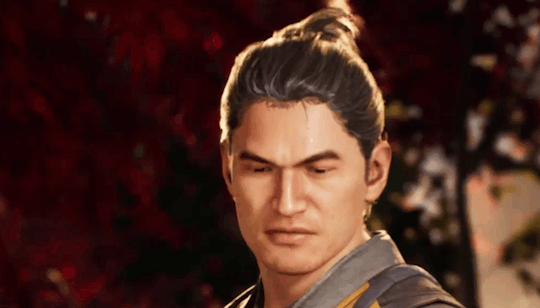
His face expresses arrogance, he's looking down on whoever is in front of him. He doesn't smile, doesn't display any expression that one could interpret for kindness. He looks cold. Does that arrogance and coldness look familiar at all?

It's the same expression as this one. Bi-Han is also shown looking down on others, with the exact same confidence stemming from the idea that he is superior to others. Kuai Liang mirrors that expression perfectly. They're brothers, they're similar in the way they act and think, in the way they were raised. Let's not forget that Kuai Liang was second in line for the grandmaster title while with the Lin Kuei. He is grandmaster of the Shirai Ryu now. They are both arrogant.

Tomas is the only one of the three who smiles and has a warm, kind aura to him. I'm not saying he's a perfect ray of sunshine, he's certainly capable of being ruthless just like his brothers, but he doesn't share their overwhelmingly negative traits.
There is no warmth to Kuai Liang at all, which is ironic given that his element is fire. Kuai Liang's fire, however, burns cold to match Bi-Han's ice. They are not opposites, they are the same.
Hanzo as Scorpion was driven by grief and ultimately love for his family, Kuai Liang's fire is only fueled by hatred for his brother.
While Bi-Han is obsessed with power, Kuai Liang's obsession with honor and tradition is crossing the line to fanaticism. Am I the only one to find it concerning how he worships his father and his father's ideals almost religiously? It's pretty much all he ever talks about at any given chance.
to Bi-Han: "His teachings did not pass with him. They should still guide us." to Bi-Han: "Father would turn in his grave if he saw this." to Smoke: "We must chart a new course. One that both honors our Father's legacy and serves Earthrealm." to Kitana: "Death before dishonor." to Smoke: "Only if we honor tradition."
Is this how a normal person talks? I don't think so. Admittedly, Bi-Han's methods are wrong, but since when is it a good thing to be completely against progress? Kuai Liang is stuck holding onto outdated traditions that don't allow for growth. It's not necessarily a bad thing that he looks up to his father, but idolizing someone to the point of never questioning anything they do or say and giving up any critical thinking is dangerous.
There's plenty more examples in the story mode and intros where Kuai Liang brings up honor and tradition, but this post is going to be long enough as it is so I only named a few.
I want to focus more on how Kuai Liang treats other characters throughout the story.
Tomas:

Why does the fandom claim he's such a good brother to Tomas when this is the only scene in the story mode where Kuai Liang expresses any sort of care towards Tomas — in a moment where he needs Tomas on his side?
Oddly enough, he's playing at Tomas' vulnerability here by bringing up family and reassuring him that they're brothers even if they don't share blood, in direct contrast to how Bi-Han said Tomas' blood was not Lin Kuei earlier. Words he chose carefully and deliberately, not out of the goodness of his heart because he wanted to comfort Tomas, but to achieve the desired effect: to sway Tomas to his side.
Similar to Bi-Han, Kuai Liang is a manipulative and calculating character. I would even dare to go as far as to say he's even more manipulative since Bi-Han lacks the charisma and patience to be a successful manipulator. Bi-Han makes no effort to convince Tomas to join him. He can't even keep up the lie he told Kuai Liang for very long. Bi-Han's actions are impulsive and poorly planned out, he's the naive one being manipulated by characters like Shang Tsung while Kuai Liang makes smart, calculated moves. He knew exactly what he was doing when speaking to Tomas.
I don't see how that was even necessary since Tomas would have picked Kuai Liang's side regardless simply because it's the one aligning with his own beliefs, but Kuai Liang's words were a subtle "Hey, remember that I'm the one who considers you part of this family and he does not. If you don't side with me, you're going to betray your own brother."
One of the key signs to recognize a manipulator by is how they try and convince a person close to them that it's "the two of them against everyone else" or in this case "them against their older brother". Manipulators know someone's weaknesses (Tomas' desire to be a part of their family) and how to exploit them to get what they want.
There was never even the slightest chance that Tomas would have sided with Bi-Han in that fight anyway, but he also appears way more passive in it as opposed to Kuai Liang. Tomas doesn't want to fight his own brother, but at the end of the day he cares more about doing the right thing and saving innocent lives than about his inner conflict. For Kuai Liang, it's a quest for vengeance and the pursue of his own goals above all else.
I also think it's interesting that Tomas looks slightly surprised/ confused at the hand being placed on his arm by Kuai Liang. It's almost like he's not used to being reassured like this which makes you wonder how often Kuai Liang really comforted Tomas or showed any support towards him. Like Liu Kang and everyone else, Kuai Liang barely acknowledged Smoke's presence before. They're only seen exchanging occasional glances.
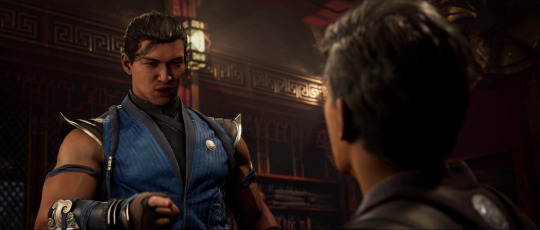
What has me doubt the sincerety of Kuai Liang's words even more is this scene.
Personally, I don't believe that Bi-Han has ever snapped at Tomas like that before this incident here, but I know the fandom likes to think otherwise so just for this take let's go with the wrong assumption that Bi-Han used to put Tomas down like that regularly.
Why did Kuai Liang not step in to defend Tomas in this scene? If he knew where this was going why did he let Bi-Han finish his sentence? It's certainly not out of respect or because Bi-Han is their grandmaster. Kuai Liang has no issue talking back to him and contradicting him in other situations but he was surprisingly silent when this whole thing went down.
He was either just as surprised as Tomas that Bi-Han would snap at their brother like that because it hasn't happened before or because he simply didn't care to interrupt since he had nothing to gain from it, unlike later when he wanted Tomas' loyalty for himself.
Kuai Liang could have been standing up for Tomas in this situation if he was the good brother everyone sees him as, but for some reason he didn't. Make of that what you will.
As for the intros between them, there's only one where Kuai Liang asks about Tomas' family. In every other intro with Tomas he only speaks of his own goals. Honor, tradition, training the Shirai Ryu, defeating the Lin Kuei... At one point he praises Tomas for his loyalty towards him, only to question said loyalty later on.
Scorpion: Our resolve cannot waver, brother. Smoke: I'm offended that you think mine has.
If I'm not mistaken, that's a prime example of manipulation right here. Guilt tripping/shaming someone into doing something they don't even want to do.
Kuai Liang seems to always be working an angle with Tomas. Why is he suddenly doubting him? Because he knows Tomas wants peace, not war between the brothers?
Ultimately, it seems he doesn't care about what Tomas wants. We know that Tomas is torn in this conflict, he resents Bi-Han, but he also doesn't want his brothers to fight. Otherwise, he wouldn't have asked for Liu Kang to reunite them.
Tomas' intros are a whole paradox of their own.
Smoke: Are we to be enemies for life? Sub-Zero: Unless you submit, Tomas.
Smoke: I'll never forgive Bi-Han. Scorpion: His betrayal has seared both our hearts.
Scorpion: We'll soon meet the Lin Kuei in battle. Smoke: It will be our last with them. Smoke: For Earthrealm's sake, my brothers must reunite. Raiden: There's little hope for that, Tomas.
Smoke: Can I get the brothers to reconcile? Liu Kang: They must choose their own path, Tomas.
What Tomas says to other characters contradicts everything he says to Kuai Liang. But why? Why does he never tell Kuai Liang directly that he'd just wish him and Bi-Han would stop fighting? Why if not because he's afraid of Kuai Liang's reaction and that he will lose him as a brother unless he agrees with everything Kuai Liang says?

SPOILERS: It's interesting how Kuai Liang in this scene asks Tomas to help him bring Bi-Han back with them so he won't be able to aid Shang Tsung, but according to leaks he's going to leave Bi-Han behind with Havik in the dlc, not even caring about the consequences that might have for Bi-Han or for Earthrealm. Now that Tomas isn't there he no longer has to keep up the facade. Tomas' absence also makes me wonder if he maybe got tired of Kuai Liang's spitefulness and blind hatred.
To sum it up, here's what we know about how Kuai Liang treats Tomas:
Kuai Liang initialy doesn't defend Tomas against Bi-Han's harsh words
He picks an odd timing to comfort Tomas at the Ying Fortress, possibly to assure that Tomas will join his side, not Bi-Han's
He's trying to push his own agenda onto Tomas who agrees with him in their intros but doesn't seem to share Kuai Liang's goals when speaking to other characters like Liu Kang or Raiden
SPOILERS: It seems that Tomas won't be attending Kuai Liang's wedding as he's not mentioned at all in any of the dlc leaks. He might be trying to stay out of the fight between his brothers entirely.
Bi-Han:
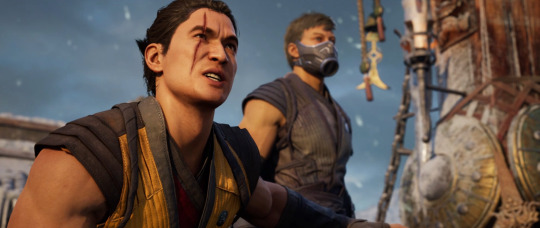
Another detail I've noticed is how quickly Kuai Liang comes up with the idea to create the Shirai Ryu. How likely is it that he made the decision to form an entire new clan on the spot? He seems way too prepared for this scenario.
Smoke: Once he's exposed, won't you be grandmaster? Scorpion: You forget Cyrax and Sektor. Their loyalty to Bi-Han is absolute. They'll sooner abet his corruption than follow me. We must chart a new course.
Why did Tomas not know about this when they're part of the same clan but Kuai Liang knows the answer immediately? It's almost like he has thought it through before, tried to figure out exactly who would side with him and who wouldn't if it came down to important Lin Kuei members choosing between him and Bi-Han. And that's because he has. It even says so in his official bio.
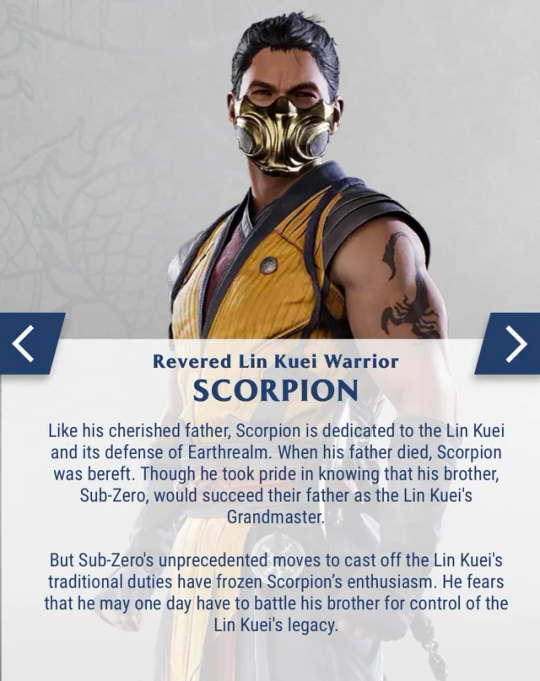
Kuai Liang always intended to overthrow Bi-Han.
He admitted that he was aware of Bi-Han's frustrations all along and yet he never brought up his concerns to Liu Kang or anyone else. It seems that he intended to take advantage of how mentally unstable his brother was in order to become grandmaster himself. I'm not saying he always wanted the title to himself, Kuai Liang doesn't care about power, but his obsession with tradition equals Bi-Han's obsession with power. He wanted to rule the Lin Kuei himself to enforce his own ideals and when he realized that wouldn't work out, he settled for the next best thing: creating his own clan.
Kitana in comparison also knows that Mileena is impulsive and many people doubt that she's fit to lead but she supports her sister regardless. Her loyalty to Mileena is unwavering. Kitana loves and supports her sister unconditionally. It doesn't even once cross her mind to take Mileena's place on the throne.
Kuai Liang and Kitana share similar values, yet Kitana's loyalty to her sister outweighs all that while Kuai Liang didn't hesitate to plot against Bi-Han way before Bi-Han even sided with Shang Tsung. Just Bi-Han's frustration alone was reason enough for Kuai Liang to want to overthrow his brother.
Ashrah, a complete stranger, cares more about redeeming Bi-Han than his own brother does. And no, Kuai Liang's actions can't be justified by bringing up that Bi-Han let their father die or betrayed Earthrealm etc. because Kuai Liang gave up on him long before any of that happened. In fact, the way Kuai Liang constantly brings up their father at every chance he gets probably added to Bi-Han's frustrations and is part of the reason why he was driven to madness.
Scorpion: Glory? We fight for duty. Sub-Zero: Does our father's ghost possess you? All I hear is his voice.
Bi-Han seems haunted by their father's ghost and Kuai Liang knows, yet he doesn't shy away from bringing it up at every opportunity. Was it done on purpose? Who knows.
But it's noteworthy that it's again manipulative behavior. The way Kuai Liang constantly criticizes Bi-Han, undermines his authority, compares him to their father whenever he can although he knows about Bi-Han's frustrations, then claims a shadow has fallen on Bi-Han's soul when he at the very least partially helped cast that shadow.
I'm not sure why people claim Kuai Liang was supportive of Bi-Han before his betrayal because there's no evidence of that at all. At least, none that I could find. Kuai Liang seems reluctant to follow Bi-Han's orders and he also doesn't seem to respect him much. Again, compare that to how Kitana shows actual concern for Mileena while Kuai Liang just seems fed up with Bi-Han.
Personally, I believe Kuai Liang's goals are far bigger than we know at this point. Something about the line "The Shirai Ryu won't rest until Bi-Han is defeated and the Lin Kuei's honor is restored" suggests that, while he built his own clan, Kuai Liang still has some interest in the Lin Kuei. I doubt that he's just planning to take down Bi-Han to let someone else be grandmaster in his place. I think that Kuai Liang wants to merge both clans once Bi-Han is defeated. After all, Kuai Liang's bio mentions that he's willing to fight his brother for control of the Lin Kuei's legacy. He might think it would be in his father's interest if he became grandmaster of both clans. However, that's just an educated guess and might not be true at all.
How Kuai Liang treats Bi-Han:
Kuai Liang never trusted Bi-Han's leadership skills or acknowledged his authority
The conflict of interest between the brothers always existed, even before Bi-Han switched sides and Kuai Liang always planned to take the grandmaster title from Bi-Han
Kuai Liang attempted to (and would have) killed Bi-Han but was interrupted in doing so
He's eager to fight Bi-Han, while Tomas is reluctant
He seems to have always held very little love for Bi-Han, if any at all, although he claims they used to be close once
Harumi:
Does no one else think it's a little bit suspicious that the woman Kuai Liang ends up "falling in love with" is a capable fighter and head of her own clan, someone with exactly the resources, knowledge and means to provide Kuai Liang with everything he needs to build his own clan? He even names the Shirai Ryu after Harumi, a clan whose goal it is to take down Kuai Liang's hated brother, someone Harumi probably knows little about or never even met. Maybe I'm the only one to think that's kind of messed up and not a romantic gesture, but at least he's giving her some credit, right? Does Harumi lead the Shirai Ryu with Kuai Liang or did he take her own clan from her to build his own? I couldn't really find any information regarding that but it would be even more messed up if the Shirai Ryu are originally Harumi's clan that Kuai Liang simply took over.
Another weird detail is how Smoke calls Harumi Kuai Liang's "good friend" in his own ending, which makes you wonder if he left the Shirai Ryu before Kuai Liang and Harumi became a couple? Does he know Kuai Liang doesn't actually love Harumi? It's confusing because Tomas is the person closest to Kuai Liang. Shouldn't he be the first to know if his brother fell in love and is planning to get married?
Kuai Liang's reaction when Kitana congratulates him on his marriage is rather cold as well. He doesn't seem like a happy, newly married man and it makes me think their marriage wasn't necessarily out of love, at least not on Kuai Liang's side.
How Kuai Liang treats Harumi:
There's not enough known about their relationship yet to really know if Kuai Liang's love for Harumi is genuine
He benefitted a lot from his friendship with her when creating the Shirai Ryu
It's strange that Tomas only calls Harumi Kuai Liang's "good friend"
Final conclusion:
Kuai Liang seems to follow a pattern of binding people to him emotionally (Tomas, Harumi... ) to be able to use them to his own advantage. I'm not saying that he doesn't care about them at all, but first and foremost, they're assets to him and family second.
For someone who claims to care about honor, Kuai Liang sure has very little of it. SPOILERS: The fact that Kuai Liang is willing to let Bi-Han die and deny him treatment when he gets infected with chaos magic says a lot about the type of person he is. How is it honorable to kick a man when he's down? How is it honorable that he wants to kill Frost during his own wedding and Harumi has to beg him to spare her life?
To get this straight, this is not an attempt to paint Kuai Liang as the epitome of all evil or to say he doesn't care at all about the people in his life, just that he's much more cold and calculating than people give him credit for. Just because Kuai Liang has chosen the good side while Bi-Han went down the wrong path doesn't necessarily make him a nice person. He's still vindictive and selfish. He still shows toxic behavior.
I know someone will try and twist this post into something it isn't, so let me say this is NOT a personal attack on Kuai Liang fans or an attempt to spread negativity, it's just my opinion that you're free to disagree with. I blame the writers and their obvious bias for Scorpion that Kuai Liang's bad traits are so often overlooked. This post is only me sharing my thoughts. If it offends you, block me. I don't want to see this reblogged with paragraphs from people trying to defend Kuai Liang.
#kuai liang#mk scorpion#bi han#mk sub zero#tomas vrbada#mk smoke#lin kuei brothers#mortal kombat 1#mk1 2023
446 notes
·
View notes
Text
I get the frustration around shipping within this fandom. No, really I do. It does take up a lot of the bandwidth in the conversations around the show. I don't blame the fans, though. This is really Bryke's fault. They may not have started the ships wars, but they definitely threw napalm on the bonfire. Add that and the fact that when you really look at it, the friendships- the relationships that were supposed to be the backbone of the series- don't really add up to much. The biggest mistake was trying to make Aang the heart of the group and have so much of the "friendships" hinge on him. The kid has zero empathy and nil desire to actually get to know his friends.
His closest bonds are supposedly Katara and Zuko. I've talked at length about how little focus Katara gets in their relationship, platonic or romantic. His interest in her is very shallow, and mostly focused on the fact that she's pretty and sweet. Any moment of real, in depth friendship between them is Katara supporting him and caring for his feelings, but the moment she needed him to give her the same energy, he compared the death of her mother to his losing Appa for a few days, and compared her desire for targeted justice to Jet trying to do a deep cleanse of an entire community which included children (and possibly other EK citizens). Then the episode ended with his continued misunderstanding of Katara with no attempt at getting to know her better.
His other major bond is supposed to be with Zuko, but I have many of the same criticisms (minus his hyper focus on how pretty Zuko is). Honestly, I don't think Zuko and Aang actually had that strong of a friendship. We know they were "best friends" by the end because the narrative says so, but aside from that moment after Pouhai, and their field trip to see Ran and Shaw, they don't have a ton to do with each other. Even their training together is glossed over. Zuko is more narratively tied to Katara, and he has a stronger "bros" vibe with Sokka, and even Jet, for a quick moment.
If I'm keeping it a whole buck, Aang isn't really a great friend to anyone in the Gaang. The strong friendship beats have more to do with how they are friends to him than the other way around. He doesn't offer much by the way of empathy, or even a desire to know the struggles of his friends. I know that's mostly a failing on the part of the writing, but I do like exploring that as a character trait of Aang. His negative traits are a lot more interesting to explore than his positive ones.
I love the stories that explore the friendships within the Gaang. I love writing stories that do those friendships. In particular, I think the potential Katara, Toph and Suki, and Sokka and Zuko friendships had so much potential. And I'm right. They do. But let's be real here. The major points of interest within the show are the ships. And i think it was partially by design. Who else remembers how hard the show's promo material pushed the Zuko/Katara/Aang triangle?
#atla#zutara#anti aang#anti kataang#the friendships had potential#they just weren't given enough space to breathe in the show#blame it on bryke#that always works for me
221 notes
·
View notes
Text
The comparison I’m about to make is sort of a silly one, but it’s one that I think about a lot so I’m gonna make it anyway 😛
A big problem that Caitlyn stans have is that they love to say people just hate complex characters — typically complex female characters. Now, this falls flat for a myriad of reasons but the one I’d like to get into is that Caitlyn simply isn’t a very complex character, nor is she a well written one. This might lose some of you here — that’s okay — but comparing her to Rin (The Poppy War by R. F. Kuang) is light night and day in terms of characterization and fandom response.
It is a little silly, because the tones and message of The Poppy War vs Arcane are very different, but they’re both political statements at their core.
Caitlyn is not a good person, but the way she’s written makes it clear that she’s supposed to be. The audience is supposed to believe that, after everything that she’s done wrong and everybody that she’s hurt, she is a good person at her core. The problem arises from the fact that the writers want her to be a good person, while using the aesthetics of moral greyness for her character development. The dictator arc is never actually supposed to be bad, nor is she a bad person by the end of it — it’s simply a tool used to that Caitlyn and Vi have something to overcome (that being Caitlyn’s bout of immorality and martial law) at the end of the show. But I’ve already said all of that (and more, in better formatted posts) so I won’t regurgitate my old posts.
Caitlyn stans have an odd way of addressing her presumed complexity, however. They laud her as a wonderfully written complex character, and tell those who dislike her that they just cannot handle morally grey characters. This doesn’t really stick, though, when Caitlyn stans go out of their way to claim that she’s still a good person. Caitlyn being a good person, her actions having a just and pure motivator even if they were carried out poorly, her classism being artfully swept under the rug — it all removes any actual complexity and moral greyness from her character. She can’t be morally grey and a good person.
While The Poppy War has many of its own faults, and despite the fact that I actually don’t really like Rin, she’s undoubtedly a better representation of a morally grey, complex female character. R. F. Kuang is very, very deliberate in writing Rin as
1.) A BAD person. She’s not even really morally grey, she is a bad person.
2.) An exceptionally unreliable narrator.
These two traits are a key factor in why Rin is a better written, more tolerable version of the character that Caitlyn was supposed to be. Rin is clearly shown as a bad person — even in her own skewed, self-important view of herself — for the genocide of the Mugenese people, EVEN IF the Mugenese Federation was actively committing every crime against humanity to the Nikaran people. Moreover, the consequences of Rin’s actions — interpersonal and political — are very clearly shown. She loses friends, and people are mutilated and die because of what she does. Her wiping out Longbow Island was never framed as something just — and she had motive and knew oppression intimately, unlike Caitlyn.
Alongside her canonically being a bad person — with negative traits that are shown probably more than her positive traits — the fandom treats her much differently. It would be untrue if I said that some of the fandom didn’t absolve Rin of any wrongdoing because she is perceived as a “girlboss feminist” type of character, the majority of the fandom understands that she is — at best — a morally grey character. Her complexity is never doubted, but that doesn’t make her particularly moral or likeable. Nobody ever questions that she has done objectively immoral things that had a real, tangible effect. Caitlyn fans do.
The rant wasn’t particularly well put together, but it was something that I’ve been thinking about for ages.
Honestly? I don’t even like Rin. I think she’s insufferable even looking past the insanity and war crimes. But I think she is so much more of a better character than Caitlyn that it almost feels unfair to compare them.
#arcane critical#arcane criticism#arcane critique#arcane critic#anti caitvi#anti caitlyn kiramman#arcane season 2#caitvi critical#arcane#arcane league of legends#the poppy war#tpw trilogy#tpw#fang runin#rin tpw#fang runin critical#the poppy war critical#can you guys tell I like em dashes or no#lowk I’m getting into haikyuu again#so arcane posts will prolly be more infrequent#sorry guys
57 notes
·
View notes
Text
The Former Nightmare Critter

(Theory a little lower this post)
Decided to make a drawing similar to how Mob Entertainment showed the Nightmare Critters but this time with the idea of Catnap being one of the Nightmare Critters in the past.
His name when he was with the Nightmare Critters was "Nightmare of "Night" as shown. To be honest, none of the critters knows Catnap's real name, they just give whatever name and see if it sticks which in this case was "Night".
The Nightmare Critters represent negative traits typically such as laziness, gossip spreading, narcissism, etc. For Nightmare, the negative traits he takes after are his unsettling nature, obsessive loyalty, and the nightmares he often provides as punishment if a Nightmare Critter goes too far. His charm is a dream catcher which I figured would make sense.
Some additional facts include the extra markings painted by Simon because he thought it would make Nightmare look cooler, the fact that his smell is still Lavender which is also a nickname(Lavender) that Baba has for Nightmare(I also imagine Dogday giving him more moon-like nicknames such as "Moon", "Moonlight" etc.), and Touille was the replacement for Nightmare once he left.
The Nightmare Critters still view Nightmare/Catnap positively but admittedly a couple of them felt hurt and betrayed when Catnap left to be with Dogday. They consider Dogday to be someone who "stole" Nightmare away from them because he was the reason Nightmare left after all.
Now, although this could be easily an Au, there can be some parts of this that could make sense being added onto the story of Poppy Playtime especially with the lore of the line of Nightmare Critters even after the Smiling Critters were deemed a failure.
Imagine this, the Smiling Critters began failing and one of the main reasons was because Catnap often was considered creepy by children watching the show, and the "Catnap Killer" incidents where the plush caused horrific nightmares made things worse. They couldn't get rid of all of it because it had already launched and Playtime Co. was forced to innovate and find a new solution to this issue.
They realized that if these characters were considered too creepy for children, then why not make a variation that would be for older audiences, thus making the Nightmare Critters. With this, they could use the Nightmare Critters as their explanation for certain things about the Smiling Critters such as why Catnap was more creepier than the others.
Why? Simple. Catnap was a former Nightmare Critter. That's why he's the odd one among the other Smiling Critters. That's why he would be the one giving "violent nightmares" as that might just be a shadow of his former self bleeding once in a while(the name matches as well). It might not be perfect but it could do the trick and if things went well enough, then they could use this plot point as an explanation for why the Nightmare Critters would be against the Smiling Critters.
I'm not saying that idea is canon or going to be canon but if it ever has something similar to this, I wouldn't be surprised.
Now then, going back to the "Night", what are some of your headcanons and ideas about the relationship and possible interaction between Nightmare and the other members?
#digital art#fanart#poppy playtime 3#catnap#smiling critters#poppy playtime fanart#poppy playtime#catnap fanart#poppy playtime catnap#catnap poppy playtime#nightmare critters#the smiling critters#touille#simon smoke#poppy playtime art#poppy playtime chapter 4#ppt 4#ppt chapter 4#ppt fanart#poppy playtime theory
114 notes
·
View notes